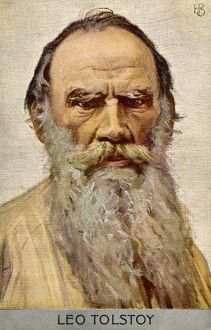Leo Tolstoy Archive
Written: 1887
Source: "A Russian Proprietor and Other Stories," by Leo Tolstoy, translated by Nathan Haskell Dole, 1887, published by Thomas Y. Crowell & Co., New York, 13 Astor Place.
Transcription/Markup: Andy Carloff
Online Source: RevoltLib.com; 2021

"O-okh! alas for my wretchedness!" exclaimed Arína, sighing deeply.
She paused, and looked angrily at her son. Davidka immediately turned around, and, clumsily lifting his stout leg incased in a huge dirty boot over the threshold, took refuge in the opposite door.
"What shall I do with him, father?" continued Arína, turning to the prince. "You yourself see what he is. He is not a bad man;[40] doesn't get drunk, and is peaceable; wouldn't hurt a little child. It's a sin to say hard things of him. There's nothing bad about him, and God knows what has taken place in him to make him so bad to himself. You see he himself does not like it. Would you believe it, father,[41] my heart bleeds when I look at him, and see what suffering he undergoes. You see, whatever he is, he is my son. I pity him. Oh, how I pity him!... You see, it isn't as though he had done any thing against me or his father or the authorities. But, no: he's a bashful man, almost like a child. How can he bear to be a widower? Help us out, benefactor," she said once more, evidently desirous of removing the unfavorable impression which her bitter words might have left upon the prince. "Father, your excellency, I"—She went on to say in a confidential whisper, "My wit does not go far enough to explain him. It seems as though bad men had spoiled him."
She paused for a moment.
"If we could find the men, we might cure him."
"What nonsense you talk, Arína! How can he be spoiled?"
"My father, they spoil him so that they make him a no-man forever! Many bad people in the world! Out of ill-will they take a handful of earth from out of one's path, or something of that sort; and one is made a no-man forever after. Isn't that a sin? I think to myself, Might I not go to the old man Danduk, who lives at Vorobyevka? He knows all sorts of words; and he knows herbs, and he can make charms; and he finds water with a cross. Wouldn't he help me?" said the woman. "Maybe he will cure him."
"What abjectness and superstition!" thought the young prince, shaking his head gloomily, and walking back with long strides through the village.
"What's to be done with him? To leave him in this situation is impossible, both for myself and for the others and for him,—impossible," he said to himself, counting off on his fingers these reasons.
"I cannot bear to see him in this plight; but how extricate him? He renders nugatory all my best plans for the management of the estate. If such peasants are allowed, none of my dreams will ever be realized," he went on, experiencing a feeling of despite and anger against the peasant in consequence of the ruin of his plans. "To send him to Siberia, as Yakof suggests, against his will, would that be good for him? or to make him a soldier? That is best. At least I should be quit of him, and I could replace him by a decent peasant."[55]
Such was his decision.
He thought about this with satisfaction; but at the same time something obscurely told him that he was thinking with only one side of his mind, and not wholly right.
He paused.
"I will think about it some more," he said to himself. "To send him off as a soldier—why? He is a good man, better than many; and I know.... Shall I free him?" he asked himself, putting the question from a different side of his mind. "It wouldn't be fair. Yes, it's impossible."
But suddenly a thought occurred to him that greatly pleased him. He smiled with the expression of a man who has decided a difficult question.
"I will take him to the house," he said to himself. "I will look after him myself; and by means of kindness and advice, and selecting his employment, I will teach him to work, and reform him."[56]